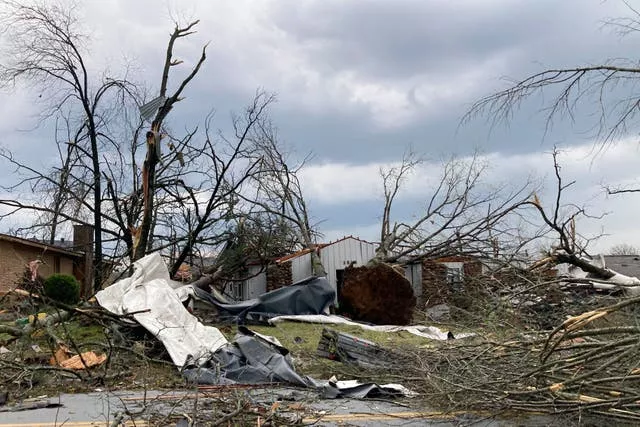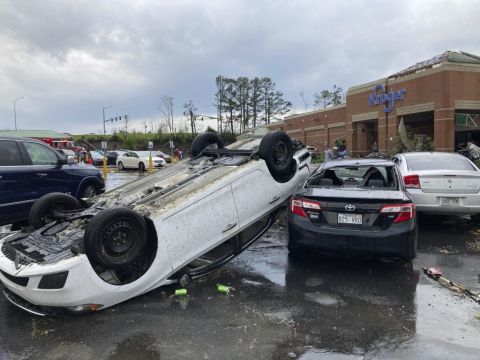A monster storm system tore through the US south and midwest on Friday, spawning deadly tornadoes that shredded homes and shopping centres in Arkansas and collapsed a theatre roof during a concert in Illinois.
At least one person was killed and more than two dozen were hurt, some critically, in the Little Rock area of Arkansas, authorities said.
The town of Wynne in north-eastern Arkansas was also devastated, and officials reported two dead there, along with destroyed homes and people trapped in the debris.
Authorities said one person died and 28 more were injured when a theatre roof collapsed during a tornado on Friday night in Belvidere, Illinois.

Belvidere Police Department said the collapse occurred as a heavy storm rolled through the area and that calls began coming from the theatre at 7.48pm. It said an initial assessment was that a tornado had caused the damage.
Numerous media reports said the collapse occurred at the Apollo Theatre during a heavy metal concert in the town located about 70 miles north west of Chicago.
There were more confirmed twisters in Iowa and wind-whipped grass fires blazed in Oklahoma, as the storm system threatened a broad swath of the country home to 85 million people.
The destructive weather came as President Joe Biden toured the aftermath of a deadly tornado that struck in Mississippi a week ago, and promised the government would help the area recover.
The Little Rock tornado tore first through neighbourhoods in the western part of the city and shredded a small shopping centre.
It then crossed the Arkansas River into North Little Rock and surrounding cities, where widespread damage was reported to homes, businesses and vehicles.
In the evening, officials in Pulaski County announced a confirmed death in North Little Rock but did not give details.
Baptist Health Medical Centre-Little Rock officials told KATV in the afternoon that 21 people had checked in there with tornado-caused injuries, including five in critical condition.
Mayor Frank Scott Jr, who announced that he was requesting assistance from the National Guard, tweeted in the evening that property damage was extensive and “we are still responding”.
Widespread damage in Wynne. I’ve been in touch with local officials for updates and to direct state resources. Please follow the direction of local authorities.
Praying for the safety of all Arkansans who are in the path of these storms.— Sarah Huckabee Sanders (@SarahHuckabee) March 31, 2023
Advertisement
Governor Sarah Huckabee Sanders activated 100 members of the Arkansas National Guard to help local authorities respond to the damage throughout the state.
“Praying for all those who were and remain in the path of this storm,” Ms Sanders, who declared a state of emergency, said on Twitter.
“Arkansans must continue to stay weather aware as storms are continuing to move through.”
About 50 miles west of Memphis, Tennessee, the small city of Wynne, Arkansas, saw “widespread damage” from a tornado, Ms Sanders confirmed.
St Francis County Coroner Miles J Kimble told the AP by phone on Friday night that he was assisting the Cross County coroner in Wynne and that two people had died there in the tornado.
He said no other information was immediately available because officials were working to notify family members. The deaths were “very difficult to see”, he said.
The governor at a briefing with Little Rock officials on Friday night said the number of deaths could rise.
“We’re hopeful that it doesn’t, but I think given the nature and the volatility of the situation, we’re preparing that it could,” she said.
City councillor Lisa Powell Carter told AP that the town of Wynne was without power and roads were full of debris.
“I’m in a panic trying to get home, but we can’t get home,” she said. “Wynne is so demolished… There’s houses destroyed, trees down on streets.”

City officials implemented a curfew from 10pm to 6am.
The tornadoes continued spawning and touching down in the area into the night.
The police department in Covington said on Facebook that the west Tennessee city was impassable after power lines and trees fell on roads when the storm passed through on Friday evening.
Authorities in Tipton County, north of Memphis, said a tornado appeared to have touched down near the middle school in Covington and in other locations in the rural county.
Tipton County Sheriff Shannon Beasley said on Facebook that homes and structures were severely damaged. Downed trees and power lines blocked several roads.
Tornadoes moved through parts of eastern Iowa, with sporadic damage to buildings. Images showed at least one flattened barn and some houses with roofing and siding ripped off.
One tornado veered just west of Iowa City, home to the University of Iowa, which cancelled a watch party at an on-campus arena for the women’s basketball Final Four game.
Video from KCRG-TV showed toppled power poles and roofs ripped off an apartment building in the suburb of Coralville and significantly damaged homes in the city of Hills.
Nearly 90,000 customers in Arkansas lost power, according to poweroutage.us, which tracks outages.

In neighbouring Oklahoma, wind gusts of up to 60mph fuelled fast-moving grass fires. People were urged to evacuate homes in far north-east Oklahoma City, and troopers shut down portions of Interstate 35.
More than 109,000 customers had lost power in the state as of Friday night.
More outages were reported in Iowa, Missouri, Tennessee, Wisconsin, Indiana and Texas.
Fire crews were battling several blazes near El Dorado, Kansas, and some residents were asked to evacuate, including about 250 primary school children who were moved to a high school.
At Chicago’s O’Hare International Airport, a traffic management programme was put into effect that caused arriving planes to be delayed by nearly two hours on average, WFLD-TV reported.
The National Weather Service’s Storm Prediction Centre had forecast an unusually large outbreak of thunderstorms with the potential to cause hail, damaging wind gusts and strong tornadoes that could move for long distances over the ground.
Such “intense supercell thunderstorms” are expected to become more common, especially in southern states, as temperatures rise around the world.







